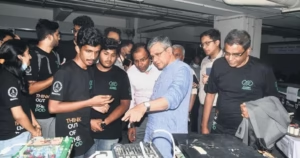Revolutionizing High-Speed Travel in India
In a groundbreaking achievement, the Indian Institute of Technology Madras (IIT Madras) has successfully completed India’s first Hyperloop test track. This state-of-the-art facility, situated on the Discovery Campus in Thaiyur, Chennai, spans an impressive 410 meters in length, making it one of the longest Hyperloop test tracks globally. This development marks a significant milestone towards transforming high-speed travel in India.
What is Hyperloop Technology?
Hyperloop is an advanced transportation concept that envisions passenger pods traveling at incredible speeds through low-pressure tubes, drastically reducing travel time between destinations. The technology aims to achieve speeds comparable to aircraft while maintaining energy efficiency and sustainability.
IIT Madras’ Trailblazing Effort

The test track at IIT Madras is a critical platform for testing and validating Hyperloop technologies in Indian conditions. This pioneering effort underscores India’s commitment to adopting cutting-edge transportation solutions and places the country at the forefront of Hyperloop research and development.
Collaborative Endeavors
The project is a collaborative effort involving multiple stakeholders:
- Avishkar Hyperloop Team: This team comprises over 70 undergraduate and postgraduate students from IIT Madras, who have been instrumental in designing and developing the Hyperloop pod and related technologies.
- TuTr Hyperloop: An IIT Madras-incubated startup, TuTr Hyperloop focuses on commercializing Hyperloop technologies for both passenger and cargo transport.
- ArcelorMittal and AM/NS India: These companies provided essential steel materials and engineering expertise for constructing the test track.
- Indian Railways: The Ministry of Railways has extended support to this initiative, recognizing its potential to transform India’s transportation landscape.
Project Milestones
The completion of the test track is the culmination of extensive research, design, and construction efforts:
- Design Phase: The Avishkar Hyperloop team conducted comprehensive design studies to adapt Hyperloop technology to Indian requirements, considering factors such as climate, terrain, and existing infrastructure.
- Construction Phase: With the support of industry partners, the construction of the 410-meter vacuum tube was completed, enabling the testing of autonomous, levitating pods at speeds of up to 200 km/h.
Future Prospects
The successful completion of the test track paves the way for several future developments:
- Testing and Validation: The facility will be used to test Hyperloop pods, focusing on aspects such as speed, safety, and energy efficiency.
- Scaling Up: Insights gained from the test track will inform the development of longer tracks and eventual commercial routes.
- Potential Routes: One proposed route aims to connect Chennai and Bengaluru, reducing travel time to approximately 30 minutes.
Global Significance
This initiative positions India as a significant player in the global Hyperloop landscape:
- Asia’s First: The IIT Madras facility is the first of its kind in Asia, highlighting India’s leadership in adopting innovative transportation technologies.
- International Collaboration: The project has attracted global partners, reflecting confidence in India’s capabilities to develop and implement Hyperloop systems.
Challenges and Considerations
Despite the progress, several challenges remain:
- Regulatory Framework: Establishing comprehensive regulations for Hyperloop operations is essential to ensure safety and integration with existing transport systems.
- Cost and Funding: Securing adequate funding for large-scale implementation is crucial, necessitating public-private partnerships and government support.
- Public Acceptance: Educating the public about Hyperloop technology and its benefits is vital for widespread acceptance and adoption.
Conclusion
The completion of India’s first Hyperloop test track at IIT Madras marks a transformative moment in the nation’s transportation history. By embracing innovative technologies and fostering collaborative efforts, India is poised to redefine high-speed travel, offering faster, more efficient, and sustainable transportation solutions for the future.
Other Stories: Home – Taaza Tarang

